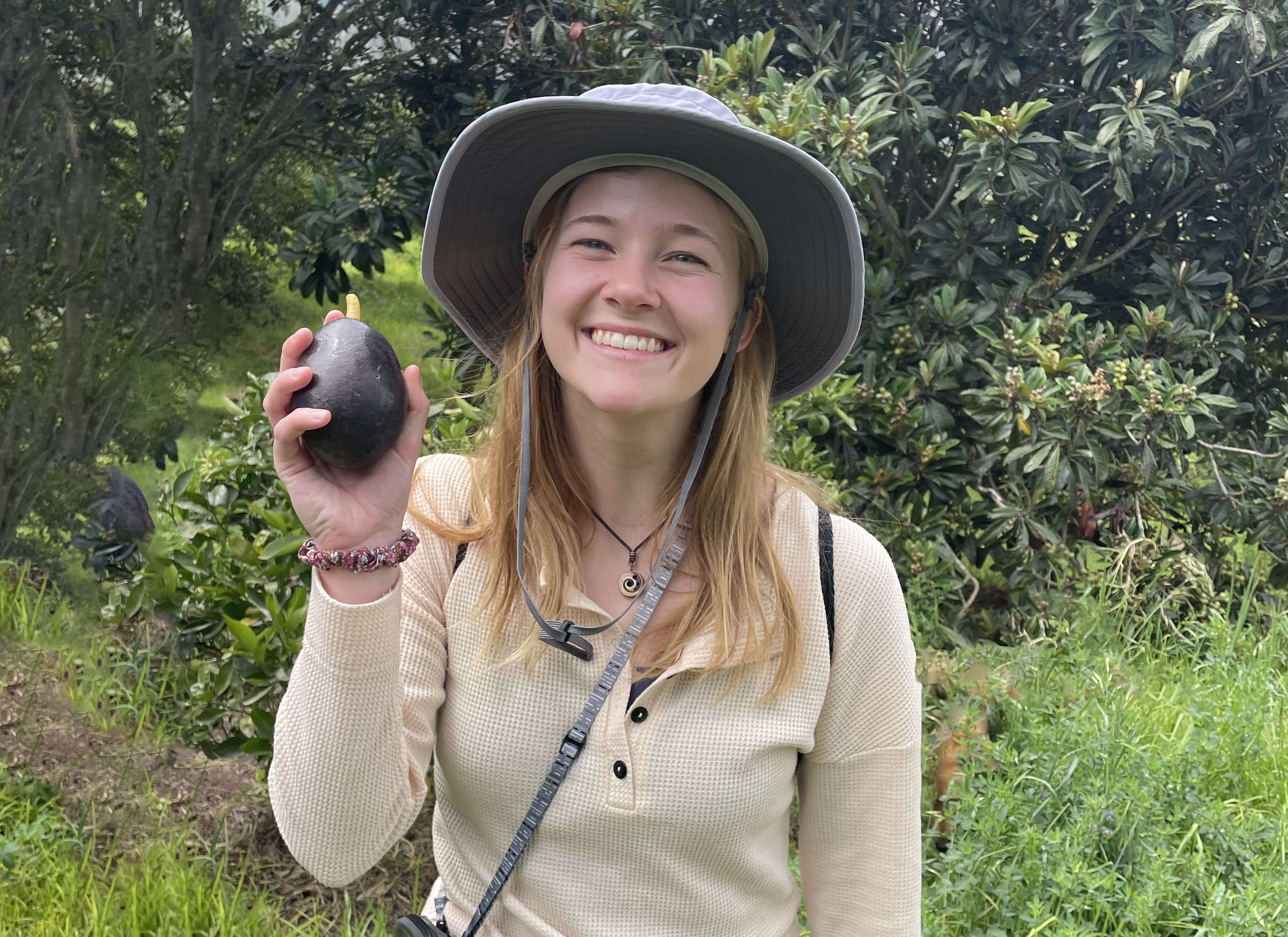Students explore Ecuador's environment
Through a winter break study abroad program in the College of Agriculture and Life Sciences, students connect with Indigenous communities to discuss environmental concerns.
Alexa Marshall harvesting avocados at Hacienda Verde, a permaculture farm in the Andean dry forest. Photo by Morgan Harvey for Virginia Tech.

Immersive explorations of the Amazon rainforest, the Andes Mountains, and the Galapagos Islands are one of the ways College of Agriculture and Life Sciences students can spend their winter breaks.
Led by Matt Eick, a professor at the School of Plant and Environmental Sciences, a group of students embarked on a journey to Ecuador to witness the intricate relationship between humans and the environment.
“The students experienced first-hand environmental issues such as climate change, plastic pollution, ecosystem degradation, and how our everyday actions and choices affect these issues,” Eick said.
Engaging with local traditions
At Hacienda Verde, a local organic farm outside of Ecuador's capital, students met with Lucia De La Torre, ethnobotanist and owner of Hacienda Verde, to discuss sustainable agriculture practices and the importance of medicinal plants deeply rooted in Indigenous knowledge systems. Torre demonstrated how aloe vera can be used as a natural toothpaste and shampoo. Students also saw how the Cochineal bug is used to create a red dye for products such as oil, soap, and cosmetics.
Visiting a local clinic for Indigenous Quichua that combines traditional and Western medicine, students had the opportunity to witness a local medicine woman, or yatchak, conduct a cleansing ritual using an egg and herbal plants on one of the students. The purpose of this ritual is to determine the individual’s ailments and is often used in conjunction with traditional Western medicine for Indigenous populations, especially those who are older and may be skeptical of Western medicine.
Artisanal weaving with Indigenous people from Otavolo also made its way onto the trip's itinerary. The group of students harvested reeds and weaved them into baskets to be sold at a local market. They also used natural dyes made from local plants to add color to the baskets.
Students also experienced Ecuador’s natural beauty and waterways with a kayaking expedition at Lake Lago San Pablo.
From left: Leo Zurita, Marina Eichenberger, Adam Clark, Maria Zurita, Bridget Crotty, Matt Eick, Alexa Marshall, and Ava Lambert on Lake Lago San Pablo. Photo by Matt Eick for Virginia Tech.

Witnessing environmental issues
"As an environmental science major and a nature lover, the most impactful part was seeing the biodiversity of the Amazon rainforest firsthand," said Morgan Harvey, a student in the School of Plant and Environmental Sciences.
Deep in the Amazon rainforest, students interacted with the Huaorani community. Discussions centered on the impact of oil drilling, deforestation for road construction, and the complex dynamics of Indigenous communities adapting to modern pressures while striving to preserve their heritage.
In the Andes mountains, students ventured into the Paramo, an alpine tundra with unique vegetation and soils. They witnessed the impacts of mining, agriculture, and grazing, highlighting the delicate balance between human activities and ecosystem health.
The expedition culminated in the Galapagos Islands, where students were immersed in the challenges facing marine ecosystems, including overfishing, tourism pressures, and plastic pollution. Students saw first-hand the effect of plastic pollution while snorkeling on the beaches of San Cristóbal.
Working with partners
Before the trip, students took part in six pre-departure meetings with Virginia Tech’s partners at the University of San Francisco Quito’s Office of International Programs. In addition to logistics, packing, health, and safety, students discussed environmental concerns, health issues, and the culture and history of Ecuador.
“This was the eighth time that I have conducted this study abroad program, and it continues to strengthen our relationship with the University of San Francisco in Quito,” said Eick. “Additionally, I have several students who are interested in returning to Ecuador to work at several of the places that we visited.”






.jpg.transform/xl-medium/image.jpg)
.jpg.transform/xl-medium/image.jpg)
.jpg.transform/xl-medium/image.jpg)